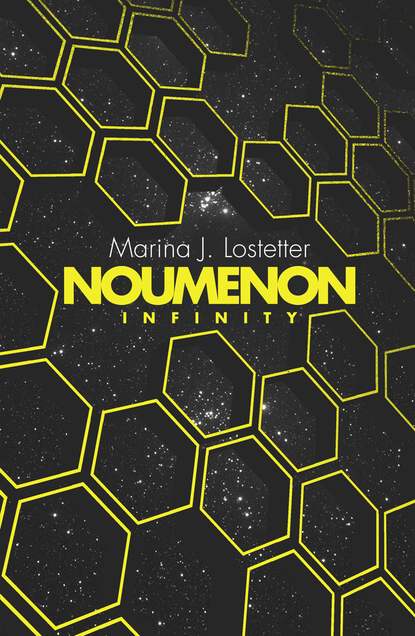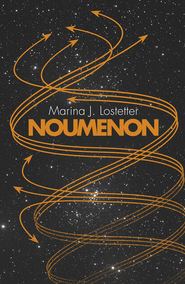По всем вопросам обращайтесь на: info@litportal.ru
(©) 2003-2024.
✖
Noumenon Infinity
Настройки чтения
Размер шрифта
Высота строк
Поля
“English,” Vanhi said to them, preempting their request for the party’s common language.
“We received an automated call for aid,” said the Mongolian security guard.
Dr. Chappell rubbed her eyes, smearing away the streaks in her makeup. “Yeah, yeah. Throw me in the brig. Whatever, stickybeaks. This mongrel and her mongrel mentor keep ruining my life, what else is new?”
“You assaulted me,” Vanhi said.
“And I’ll face the damn consequences, unlike you.”
“Ma’am, we need you to submit to a sobriety test,” said the U.S. guard.
“Like it’s a crime to get legless when your life is stolen from you?”
Both guards tried to steady her when she took a step up and forward, but she batted them off. “I’m coming with you. I’m leaving her alone. Don’t you put hands on me.”
“Ma’am, I’m going to need you to not be belligerent with us.”
“Doctor,” Vanhi said, not sure why their form of address bugged her. She never corrected anyone when they called her ma’am or miss. “She’s a doctor.”
“Shut up,” Chappell said, turning her back on Vanhi. “Take me to the brig, or whatever you’ve got up here. I don’t want to look at her anymore.”
Vanhi crouched again, sweeping the stray sheets into the manila folder. “Don’t forget your file.”
“Keep it,” she said. “Maybe if you stare at them long enough you’ll develop a twinge of empathy.”
“We’ll need you to give a statement,” the U.S. guard said as Chappell was led away. “But I know you’re under a lot of pressure, Doctor Kapoor. If you want to do it sometime after your press conference tomorrow, that’s fine.”
Hand tensing around the folder, she realized she was shaking. “Yeah, okay.”
“Do you need anything? Would you like a guard outside?”
“Um, sure. Thank you.”
“All right. We’ll send someone. They can call you when they’re stationed.”
“Got it,” said C.
The guard looked skeptically at her purse, but said nothing.
“Thank you. Good. Thanks.”
“There’s nothing else you need?”
She waved him away. “Some sleep. That’s all, thank you.”
He nodded curtly, hurrying after his colleague.
When he was gone she slipped through the door and shut it swiftly, collapsing against it for half a beat. She dropped her purse and clutched the folder to her chest.
“I’m so stupid. Why did I think I’d never have to talk to anyone from the original mission?”
“You’re not stupid,” said C from the dark depths. “All evidence indicates you are very intelligent.”
“That’s not what I meant,” she huffed, breath shaky.
“I had an indication, but thought reassurance the best response.”
“Thank you. I do appreciate it. Sleep now.”
Vanhi had never expected to encounter Dr. Chappell or her team, but she’d known the woman was angry, even from afar. How could she not be? If Chappell had sacrificed her ethics to get a once-in-a-lifetime job, and not only had that opportunity been ripped away from her, but all others as well, there would be no measured response. She’d feel guilty, and furious, and lost.
But that wasn’t quite right, was it? Someone who would purposefully skew their data—waste hundreds of thousands of man-hours and billions of dollars on a lie—wouldn’t be mad like that. They wouldn’t be mad about the things Vanhi would be mad about. They’d be mad someone had the nerve to question them. They’d be angry they didn’t get their way.
They might get violent.
They might be the type to get drunk on a Moon base and go after the weak link in their exposure. They’d threaten. They’d deny.
But they wouldn’t, of all things, ask “Why?”
Inside her, the leafy sprout shot up, budding—the flower of realization threatening to unfurl.
She shuffled over to the composite desk, tripping over the edge of the bed and her half-unpacked suitcase to get there. She let the folder fall to the table with a plop, and it scattered open like a wilting rose. The holoflex-sheets were creased—rainbow colors bowing away from the damage to show where the plasma nanocircuits were, in effect, “bleeding”—and everything was out of order. A few paper sheets were tucked in the mix.
Most of the pages were dated or belonged to a dated set. She fanned them out, attempting to reconstitute their timeline.
On the right she set Dr. Chappell’s “original” data; on the left she laid out the “undoctored” versions.
She was no biologist, but the results seemed clear: on one hand she had evidence that at least two of the planets in TRAPPIST-One likely had multicellular life. On the other, she had what looked like a correction to the original study, with a variable not originally taken into account added into the mix. That wouldn’t make Dr. Chappell’s results fabricated so much as uncorrected. It looked like she’d submitted the first results and suppressed the second.
It wasn’t uncommon to create an experiment and get fantastic results only to realize you’d constructed your experiment wrong. That was part of the scientific process. You learn, you correct, you learn again.
Perhaps Chappell had wanted so badly for there to be life in this system that she’d convinced herself the second set of data had to be wrong. Maybe she’d gone so far as to fool herself.
The flower in Vanhi’s gut grew thorns and poked. Because …
This doesn’t feel right.
There were grad students who’d stood up for Dr. Chappell when she was exposed, but there had been others who insisted the data she’d issued to the consortium wasn’t complete. They’d sworn she’d tampered with the results.
Vanhi stared at the pages, eyes not fully focused, as though the longer her gaze hovered over the pages the more likely she was to learn the truth.
Something clicked in the back of her mind, and she jumped for her purse. “C, wake up.”
“Yes?”
“You know that backdoor connection to Jamal he insisted on installing?”
“Of course.”
Другие электронные книги автора Marina J. Lostetter
Noumenon




 0
0






